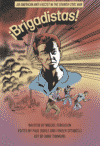
Palestine, Oh, Palestine!
In this review of Linda Dittmar’s Tracing Homelands, Paul Buhle writes, “History may yet hold hope when hope is otherwise lacking when we reject the stalemate that only leads to despair.” | more…

In this review of Linda Dittmar’s Tracing Homelands, Paul Buhle writes, “History may yet hold hope when hope is otherwise lacking when we reject the stalemate that only leads to despair.” | more…

In this exhilarating graphic novel about the Spanish Civil War, three American friends set off from Brooklyn to join in the fight—determined to make Spain “the tomb of fascism” for the sake of us all. Together they defy the U.S. government and join the legendary Abraham Lincoln Brigade, throw themselves into battle, and conduct sabotage missions behind enemy lines. As Spain is shattered by the savagery of combat during the Spanish Civil War (1936-1939), readers see the darkening clouds of the World War to come. | more…

Both Toni Gilpin’s The Long Deep Grudge and Michael Goldfield’s The Southern Key offer ample evidence that the grand era of U.S. labor history scholarship is not yet past. The Long Deep Grudge is in equal parts labor history and family reminiscence as Gilpin seeks the fuller story of her father, who played a leadership role in the United Auto Workers union. The Southern Key is in many ways a study of a different variety, but very much of a similarly militant kind. Goldfield, a labor activist veteran himself, draws the big picture of what he sees as the central failure of the U.S. left: the failure to organize the South. | more…

Instead of theory, early U.S. radicals excelled in reportage, like John Reed’s Ten Days That Shook the World, or fiction, like Upton Sinclair’s packing-house shocker The Jungle. To Europeans American thought seemed impermeable to the difficult ideas of Marxism. That changed with the founding of Monthly Review in 1949, which marked a newly realized if not entirely new trend in American Marxist thought. | more…
Chris Bambery’s splendid People’s History builds upon the scholarly work of others across several generations…. In Bambery’s careful telling, the decisive moment in anything like modern Scottish history comes several hundred years ago. The Scots’ real capitalism spread through the savage process of depopulation that Marx described so brilliantly in Capital: enclosure. Over extended decades, thousands of historic villages were literally emptied, so much so that remnants of crude huts can still be found in areas that have fewer inhabitants than sheep. The distinct language, created over thousands of years and retained with great effort in Wales, and with less effort in the rural districts of Ireland, did not need to be crudely suppressed here: the victims, pushed into the cities when not driven to early deaths, seem to have lost everything in this later period but their colorful, characteristic Scottish accents. | more…
It is surely difficult for young people today to grasp that thirty years or so ago, radical historian-activist Edward Thompson was by opinion polls intermittently the second or third most popular person in England, just after the Queen Mother. This was despite the British establishment, to say nothing of U.S. Cold Warriors (liberal or conservative), slandering him for decades—and why not? He had led massive protest movements of ordinary people against their government. Worse, in cloistered academic quarters he was viewed as having reorganized the whole idea of social history and turned it over to ordinary people! More than anyone else in the English-speaking world, he made the history of such people important. | more…
Former UN Secretary General Boutros Boutros-Ghali sets the tone in his introduction to The Poorer Nations, arguing that the moment has arrived for scholars from the underdeveloped world of plundered resources and impoverished people to make the necessary statements themselves, rather than leaving that work to the first world left. Boutros-Ghali makes one other important point: that Prashad is hard at work rediscovering the hopes of earlier decades, the moment of anti-colonialist hopes, of common feeling among various nationalities and nations freeing themselves and looking forward to a kind of communitarian developmental process that was, often enough, called “socialism.” | more…
The name “Walter Rodney” has receded from public memory in the last few decades. Only yesterday, it seems to this reviewer, Rodney was the most promising young political scholar of Afro-Caribbean origin, influential from parts of Africa to Britain and North America, not to mention his home Guyana, as well as Jamaica, Trinidad, and other anglophone islands. He was revered: great things were expected of him, as great things were expected of the new phase of regional history in which independence had been achieved and masses mobilized for real change. | more…
It is curious as well as enormously exciting to be surrounded by a mass movement, full of enthusiasm, energy, and eagerness to adopt labor slogans and labor songs, almost as if the 1930s and ’40s had come back. And it is all the more curious because the emergence of the movement seemed so spontaneous and unexpected, taking every Marxist (and any other) would-be savant by surprise, your reviewer most definitely included. Eighteen months and a major electoral defeat later, the “Wisconsin Uprising” goes on, with dampened spirits but a continuation of innovative extras. One small example is the “Overpass Light Brigade,” a group of urban guerillas who hold LED-lit slogans in various spots of the state, ridiculing Governor Scott Walker and his lackeys, until the cops arrive. But where is it going? | more…
The story Jack O’Dell is one of the least understood but most important stories in the last half-century of the American Left; important because O’Dell, in his organizing and his writing for Freedomways magazine, contributed in crucial ways to the struggle against racism. But also little understood because the taboo on American Communism and Communists has prevented individual stories from the surrounding milieux to be appreciated and understood. This review-essay brings O’Dell back to light. | more…
The previous century now seems to be drawing away from us at an increasing speed, especially in the global society’s existing superabundance of communications. Readers of Monthly Review know that the basics have remained the same in the all too physical world of capitalism and neocolonialism, as much as they might have changed in terms of resistance and apparent alternatives. Still, as the graying of the 1960s generation continues, and the New Deal era draws ever further into a kind of archeology, a summing up of some points is useful and may even be fun. | more…
This year marks the centenary of the Industrial Workers of the World (IWW), American labor’s unique visionaries. It also marks the fiftieth anniversary of the founding of the AFL-CIO, the result of the merger of the American Federation of Labor and the Congress of Industrial Organization. Remarkably it is also the tenth anniversary of the change of the guard at the AFL-CIO. In 1995, John Sweeney and his “New Voice” team, expressing the rumblings of disillusionment with then-president and prominent Cold Warrior Lane Kirkland sweeping through the middle and upper ranks of the organization, drove the old guard from the highest offices. The concurrence of the three anniversaries may be more than a coincidence. To see why, let us go back and examine some recent labor history | more…
The little-understood roots of the left offer us the chance to demonstrate a vital continuity. A bridge just now being rediscovered exists between the nineteenth century Euro-American traditions upon which the modern Marxist movements were founded, and the cultures (i.e., the collective, including artistic, expression) of minority populations old and new to the United States | more…